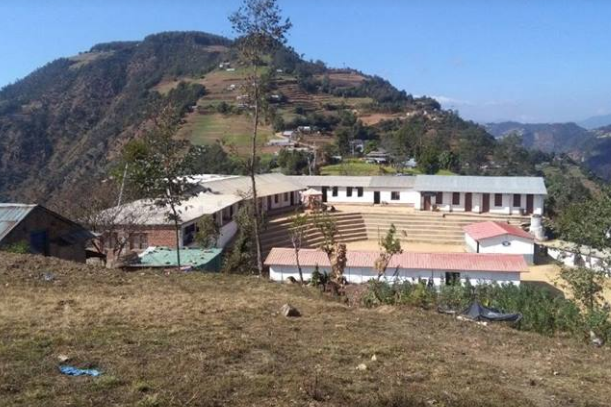Story Telling: Students' increased Awareness and Motivation
“Energy: Empowering Women Uplifting Lives” (Advocacy)
Manikhel, Lalitpur
30 June, 2017
 |
|
A beautiful view of Shree Buddha Bhagwan Ma Vi School
|
This time the Advocacy Team, lead organization, CRT/N and its consortium partner organization,
NACEUN, selected “Shree Buddha
Bhagwan Ma Vi Vidhyalaya (Higher Secondary School)” from Manikhel, South
Lalitpur for its school level awareness programme. The site was arranged
by NACEUN which has a strong hold in South Lalitpur. Joining the Team was Ms.
Laxmi Giri (senior actor) who has been a keen member of the advocacy in the
capacity of a Celebrity Icon. The Team left for Manikhel, on June 30 at 8 AM
and reached there at 12 PM.
Shree Buddha Bhagawan
Ma Vi School situated on the high hills provides an extremely lovely
environment its students. Away from hustle and bustle of urbanization and
pollution, one can enjoy fresh air, clean drinking water and open space there.
This VDC with around 90% literacy rate has nearly 331 houses and is 40 km away
from the Headquarter of Lalitpur. The schools gets its name “Shree Buddha
Bhagawan” from the ardent Buddhist people who served in the school. About hundred thirteen students participated in the awareness programme.
 The objective of conducting awareness programme is to increase the
understanding of school students and teachers about green energy (Renewable,
sustainable and clean energy), gender and impacts of the traditional practices
in energy consumptions and recognizing the role of education systems and school
community in disseminating knowledge and information. With these contemplation the
Advocacy Project-“Energy: Empowering Women, Uplifting
Lives” has been considering
schools as potential avenues to reach out to the community. The programme will
also create responsibility among students towards the current energy crisis and
inspire them to contribute in their little way to spread awareness on the use
of alternative sources of energy within their homes and their community.
The objective of conducting awareness programme is to increase the
understanding of school students and teachers about green energy (Renewable,
sustainable and clean energy), gender and impacts of the traditional practices
in energy consumptions and recognizing the role of education systems and school
community in disseminating knowledge and information. With these contemplation the
Advocacy Project-“Energy: Empowering Women, Uplifting
Lives” has been considering
schools as potential avenues to reach out to the community. The programme will
also create responsibility among students towards the current energy crisis and
inspire them to contribute in their little way to spread awareness on the use
of alternative sources of energy within their homes and their community.
On reaching Shree Buddha Bhagwan Ma Vi Vidhyalaya, we first met with the Principal
of school, Mr Dilip Kumar Syantam, an ex-student of the same school and who was already informed about the objective of our
visit. Mr Syantam welcomed us at school and made all supportive arrangements for
our program.
With help from the school staff our program commenced at 1 PM. The programme
was facilitated by Mr Rajendra Ghimire, NACEUN. Mr Ghimire briefly highlighted
about the programme while Dr Indira Shakya shared the objective of the
awareness programme. Mr Mohan Pandey, from NACEUN talked about various sources
of energy, difference between RE and non- RE, uses of energy, importance of
energy for the development, importance/ need of environment friendly energy,
about green house effects/ climate change, about bio- fuels and also about
energy crisis, ICS/ hydropower, water-mill etc. Mr Dilli Ghimire also from NECEUN
highlighted about the roles of youth in efficient and
productive uses of renewable energy sources and technologies, opportunities in
renewal energy, clean energy and utilization of local resources. Mr Dilli also
shared about the financial and technical support available for clean energy from the Government. Similarly, Dr
Indira Shakya, CRT/N highlighted mainly on gender and energy, how energy crisis
affects women and etc. Using various posters and flex the information was
imparted to make the students understand clearly and enjoy the topic. Videos
developed by the advocacy project were also displayed for more understanding of
the issue. Mr. Shyam Kumar Rai, CRT/N shared about ICS, the technology and its
importance and how to get ICS for households.
The programme remained
very interactive and effective. The students were very curious about the
issues; they asked a lot of questions during and after the workshop. The major queries
from students were:
- · What is subsidy? How to access it? What is the requirement for getting subsidy?
- · How employment can be created through energy?
- · How can we irrigate our lands from the use of RE?
- · How energy brings changes in the health and in the life of human being?
- · What is ICS? How can we get it?
- · Who is the technical person for ICS, how to contact with them?
- Can we make ICS ourselves?
 |
| Dr Indira Shakya explaining the posters |
 |
| Student participants |
The presenters (resource
person) addressed the queries of students. The students seemed quite motivated
after getting response of their questions.
During the workshop,
Ms laxmi Giri also explained about the ICS and its importance. Ms Giri went among the students and showed
posters and explained about it. Ms Giri also acted in one of the dialogue of
her movie, which all the students liked very much.
 |
| A girl asking her queries during programme |


Comments
Post a Comment